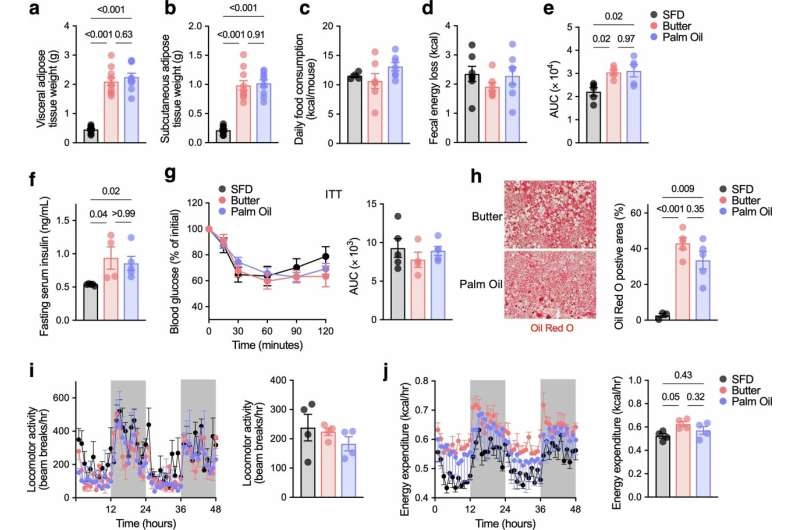Nature Metabolism (2025). DOI: 10.1038/s42255-025-01330-w>  High fat diet causes obesity and impairs systemic metabolism, regardless of dietary fat source. Credit: Nature Metabolism (2025). DOI: 10.1038/s42255-025-01330-w
High fat diet causes obesity and impairs systemic metabolism, regardless of dietary fat source. Credit: Nature Metabolism (2025). DOI: 10.1038/s42255-025-01330-w
Obesity elevates the risk of at least 13 major cancers, including those of the breast, colon and liver. It also impairs immune responses that target tumors and are stimulated by cancer immunotherapies. But it has long been unclear whether these effects stem from the sheer adiposityor mass of fatin people living with obesity or from the specific dietary fats they consume.
Now, a decade-long study led by Ludwig Princeton's Lydia Lynch and reported in the current issue of Nature Metabolism has provided a compelling answer to that question.
"Our study reveals that the source of dietary fat, not adiposity itself, is the primary factor that influences tumor growth in obese mice," said Lynch. "We found that high-fat diets derived from lard, beef tallow or butter compromise anti-tumor immunity and accelerate tumor growth in several tumor models of obese mice. Diets based on coconut oil, palm oil or olive oil, meanwhile, do not have this effect in equally obese mice. Our findings have implications for cancer prevention and care for people struggling with obesity."
Lynch and her colleaguesincluding Marcia Haigis, a senior author of the study and a member of the Ludwig Center at Harvard Universitynote that swapping out animal fats for plant fats might be a helpful dietary intervention for obese patients undergoing treatment for cancer. Such dietary changes could also potentially lower cancer risk for people living with obesity.
Lynch, Haigis and others have previously shown that obesity induces changes in the immune system and in the microenvironment of tumors that contribute to tumor progression. It does so by impairing the body's cancer surveillance system, undermining the ability of immune cellsnamely cytotoxic T cells (CTLs) and natural killer (NK) cellsto infiltrate tumors and, once there, kill their cancerous quarry.
In the current study, Lynch and her colleagues took those findings a step further. They elucidate the mechanisms by which the metabolic derivatives of dietary animal fats impair NK cells and CTLs. They also show that it is this immune dysfunction that helps hasten tumor progression in obese micean effect not seen in obese mice fed plant-based fats. In fact, a palm oil-based diet even boosted anti-tumor immunity and slowed tumor growth in obese mice.
The researchers identified several metabolic intermediates of dietary fats, especially long-chain acylcarnitine species, that potently suppress NK cells and CTLs. These metabolites were especially elevated in obese mice reared on butter, lard and beef tallow diets, but not in obese mice on plant-fat diets. They report that in CTLs, the molecules cause deep metabolic dysfunction in organelles known as mitochondriathe powerhouses of cellscompromising their cytotoxic function. This saps anti-tumor CTLs of their vitality, undermines their production of a factor (IFN-�) critical to their function and disables their cell-killing machinery.
The palm oil-based diet, on the other hand, prevented metabolic paralysis in the NK cells of obese mice, apparently by amplifying the activity of a master regulator of cellular metabolism known as c-Myc. The researchers found that Myc expression was reduced in mice fed animal fatand also in NK cells from people living with obesity.
"These findings highlight the significance of diet in maintaining a healthy immune system," said Lynch. "More importantly, they indicate that modifications to fat in the diet may improve outcomes in obese people undergoing treatment for cancer and suggest such measures should be clinically evaluated as a potential dietary intervention for such patients."
More information: Britta Kunkemoeller et al, The source of dietary fat influences anti-tumour immunity in obese mice, Nature Metabolism (2025). DOI: 10.1038/s42255-025-01330-w
Journal information: Nature MetabolismCitation: Study finds animal-based fats fuel tumor growth in obese mice, plant fats do not (2025, July 30) retrieved 30 July 2025 from https://medicalxpress.com/news/2025-07-animal-based-fats-fuel-tumor.html
This document is subject to copyright. Apart from any fair dealing for the purpose of private study or research, no part may be reproduced without the written permission. The content is provided for information purposes only.



